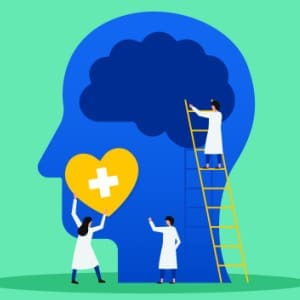I always love to start my blogs with jokes, but mental health is no laughing matter. It’s such an important topic that two awareness initiatives are conducted yearly: May is Mental Health Awareness Month, and October 10 is World Mental Health Day.
Despite many advances in recent years, there is still some stigma around mental health care. The National Alliance on Mental Illness (NAMI) advises that one of the ways to overcome the fears and assumptions about mental health is to talk about it – so here we are.
Approximately one in five adults in the United States experiences a mental illness at some point. Estimates are that 10 million adults live with a serious mental illness. Those are pretty remarkable numbers, but even more remarkable is how many people aren’t getting the treatment they need.
Mental Health Stigma Barriers
In the post-pandemic age, the Mayo Clinic examined mental health stigmas and barriers to treatment. They found that navigating the mental health care system is a major barrier. Another significant one is fear.
People may fear unfamiliar care, conditions, and treatment costs. The existence of negative stigmas may create fear of judgment and fallout. Some fear the possibility of further stress in response to treatment regimens. Finally, some see a conflict between seeking mental health care and adhering to cultural and/or religious standards of strength.
If you need to talk to someone confidentially about mental health or substance abuse issues, call SAMHSA at 1-800-662-HELP (4357).
Fighting Mental Health Stigma
According to NAMI, there are many ways to fight mental health stigmas including:
- Talk openly about mental health. Talk with your friends and family and share your personal experiences on social media.
- Education is key. Visit a licensed counselor or physician and ask for printed materials. You can also use reputable online resources like Psychology Today, the National Institute of Mental Health (NIH), and NAMI to learn more.
- Share your knowledge with those who have misunderstandings or misinformation.
- Show compassion for those with mental illness. Rachel Wagner, a member of the NAMI Facebook community, shared her experiences with NAMI. “I offer free hugs to people living outdoors and sit and talk with them about their lives. I do this in public and model compassion for others. Since so many of our homeless population are also struggling with mental illness, showing affection can make their day and remind passersby of something so easily forgotten: the humanity of those who are suffering.”
- Choose empowerment over shame. Live your life, and don’t let others influence how you feel about yourself.
- Be honest about treatment. It’s okay to tell people that you see a therapist or psychiatrist. Seeking care from a mental health professional is just as important as seeing a doctor for physical ailments.
For quotes and other tips, read NAMI’s “9 Ways to Fight Mental Health Stigma.”
Seeking Medical Help for Mental Illness
In addition to stigmas, cost is the other major factor that causes people not to address their mental health issues. As of 2014, most individual and small group health insurance plans, including plans sold on the Marketplace, must cover mental health and substance disorder services. Yet co-pays, deductibles, and other out-of-pocket costs remain unaffordable for many.
Flexible Spending Accounts (FSAs) and Health Savings Accounts (HSAs) can make mental health treatment more affordable. Eligible expenses include counseling, prescriptions, psychiatric care, and other specialized treatments.
Remember, to qualify as an eligible expense, the IRS says, “Medical care expenses must be primarily to alleviate or prevent a physical or mental disability or illness.” The following provides a quick overview of eligible mental health treatment.
Psychiatric Care
Seeing a primary caregiver is the first step toward diagnosing and treating mental health problems. However, many types of mental illness require expert attention. In addition to prescriptions, seeing a psychiatrist may be part of a treatment plan.
Psychiatrists are typically the ones who prescribe medications. They may also provide services such as psychotherapy. Psychiatric care and treatments are approved healthcare expenses.
Prescription Medications
As mentioned above, some mental illness treatments include prescription medication. Remember that most anti-depressants are available in generic form, and generic prescriptions usually cost less than their brand-name counterparts. Talk with your healthcare provider about generic medication options.
Psychology Tests and Counseling Therapies
Patients with mental health needs can also see a licensed psychologist. A psychologist may run psychological tests and use different behavioral or cognitive therapies with the patient. However, psychologists and counselors cannot prescribe medication.
Addiction Treatments
The American Psychiatric Association lists many addictive disorders as mental health issues. These include alcohol, tobacco, and substance abuse. Smoking cessation programs and treatments qualify as eligible expenses, as do in- and out-patient treatment for alcoholism and substance abuse. You can even cover the cost of meals and lodging for in-patient treatment and transportation expenses for attending meetings of Alcoholics Anonymous, Narcotics Anonymous, or similar recovery groups.
Acupuncture Treatments
Acupuncture is another common treatment for depression, eating disorders, and other types of mental illness. You may need a Letter of Medical Necessity from a physician to cover the cost with an FSA or HSA.
Mental health and wellness is an important part of healthcare. Working together, we can overcome the stigmas surrounding mental illness and promote better mental healthcare. Contact your health insurance provider to determine your policy’s coverages. You can also talk with your benefits administrator or refer to the Summary Plan Description regarding eligible expenses for your company’s FSA or HSA.

